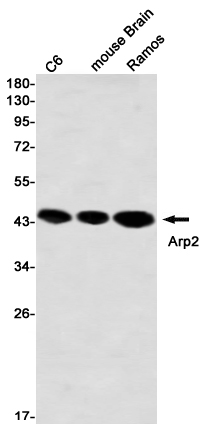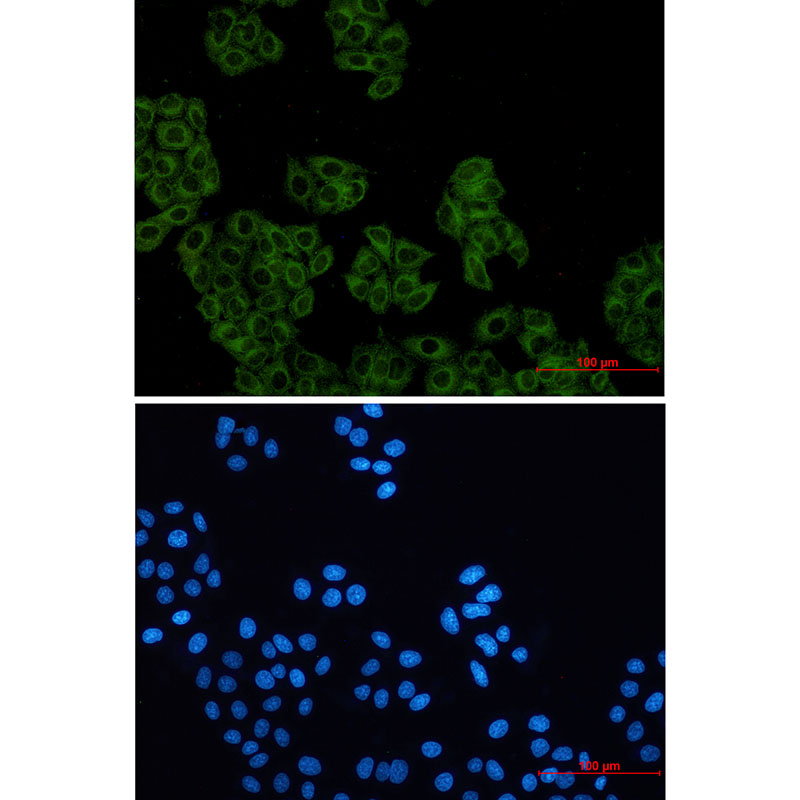

| WB | 1/500-1/1000 | Human,Mouse,Rat |
| IF | 咨询技术 | Human,Mouse,Rat |
| IHC | 咨询技术 | Human,Mouse,Rat |
| ICC | 1/50-1/200 | Human,Mouse,Rat |
| FCM | 咨询技术 | Human,Mouse,Rat |
| Elisa | 咨询技术 | Human,Mouse,Rat |
| Aliases | ACTR2; ARP2; ARP2/3 COMPLEX |
| Entrez GeneID | 10097 |
| WB Predicted band size | Calculated MW: 45 kDa; Observed MW: 45 kDa |
| Host/Isotype | Rabbit IgG |
| Antibody Type | Primary antibody |
| Storage | Store at 4°C short term. Aliquot and store at -20°C long term. Avoid freeze/thaw cycles. |
| Species Reactivity | Human,Mouse,Rat |
| Immunogen | A synthetic peptide of human Arp2 |
| Formulation | Purified antibody in TBS with 0.05% sodium azide,0.05%BSA and 50% glycerol. |
+ +
以下是关于Actin Related Protein 2(ARP2)抗体的3篇参考文献,简要概括如下:
1. **"The Arp2/3 complex is essential for actin-based motility of Listeria monocytogenes"**
- **作者**: Welch, M.D., DePace, A.H., Verma, S. 等
- **摘要**: 该研究利用针对Arp2/3复合体(含ARP2)的抗体,证实其在细菌病原体李斯特菌的肌动蛋白聚合和细胞间运动中的关键作用,为抗体在功能阻断实验中的应用提供了依据。
2. **"ARP2/3 complex is required for actin polymerization during platelet shape change"**
- **作者**: Suraneni, P., Rubinstein, B., Unruh, J.R. 等
- **摘要**: 通过特异性抗体抑制ARP2/3复合体,研究揭示了其在血小板形态变化中调控肌动蛋白动态的机制,抗体被用于免疫荧光和蛋白质相互作用分析。
3. **"Role of Arp2/3 complex in dendritic spine morphogenesis"**
- **作者**: Hotulainen, P., Hoogenraad, C.C.
- **摘要**: 研究使用ARP2抗体标记神经元树突棘中的肌动蛋白结构,证明Arp2/3复合体通过调控细胞骨架重塑影响突触可塑性和神经发育。
Actin-Related Protein 2 (ARP2) is a critical component of the ARP2/3 complex, a conserved multi-subunit protein complex essential for nucleating and organizing branched actin networks in eukaryotic cells. These dynamic actin structures play pivotal roles in cell motility, membrane trafficking, cytokinesis, and cell shape maintenance. Antibodies targeting ARP2 are widely used as research tools to investigate the spatial-temporal regulation of the ARP2/3 complex and its involvement in cellular processes such as cell migration, endocytosis, and pathogen invasion.
ARP2 antibodies are typically developed against specific epitopes of the ARP2 protein, often validated for applications like Western blotting, immunofluorescence, and immunoprecipitation. Their specificity is confirmed using knockout or knockdown controls to ensure minimal cross-reactivity with homologous proteins like ARP3. Researchers employ these antibodies to study ARP2/3 complex dysfunction in diseases, including cancer metastasis (due to altered cell motility) and developmental disorders linked to cytoskeletal abnormalities. Species reactivity commonly covers human, mouse, and rat models.
The development and characterization of ARP2 antibodies contribute to understanding cytoskeletal dynamics at molecular levels, aiding drug discovery targeting ARP2/3-mediated pathways in pathological conditions.
×